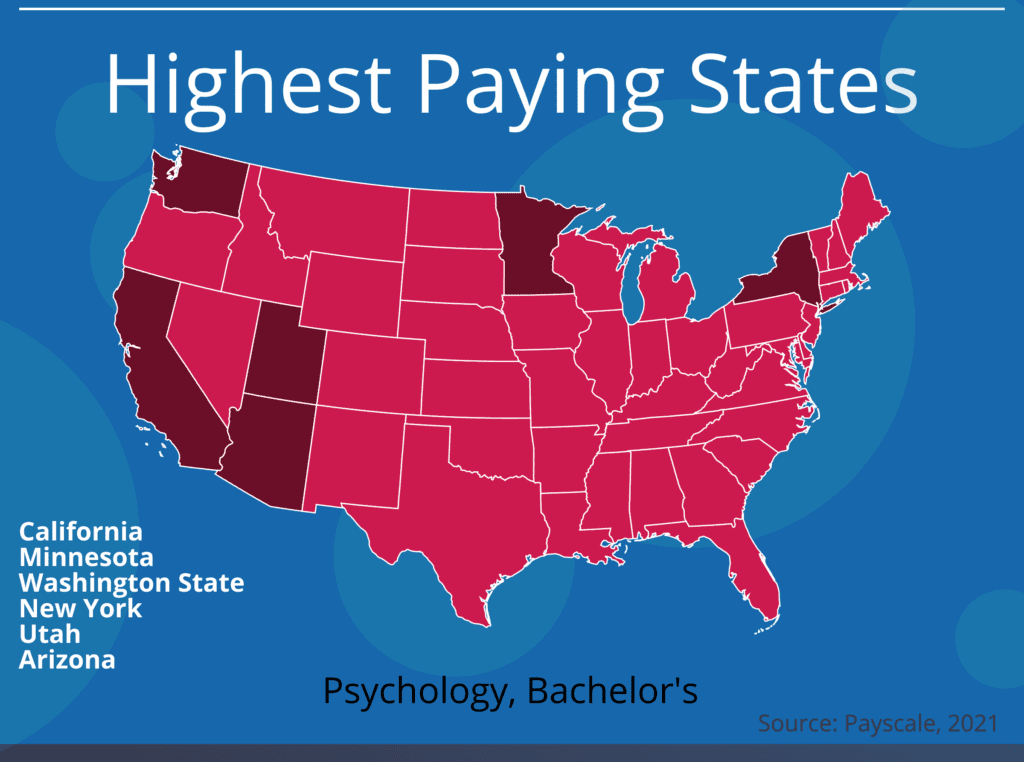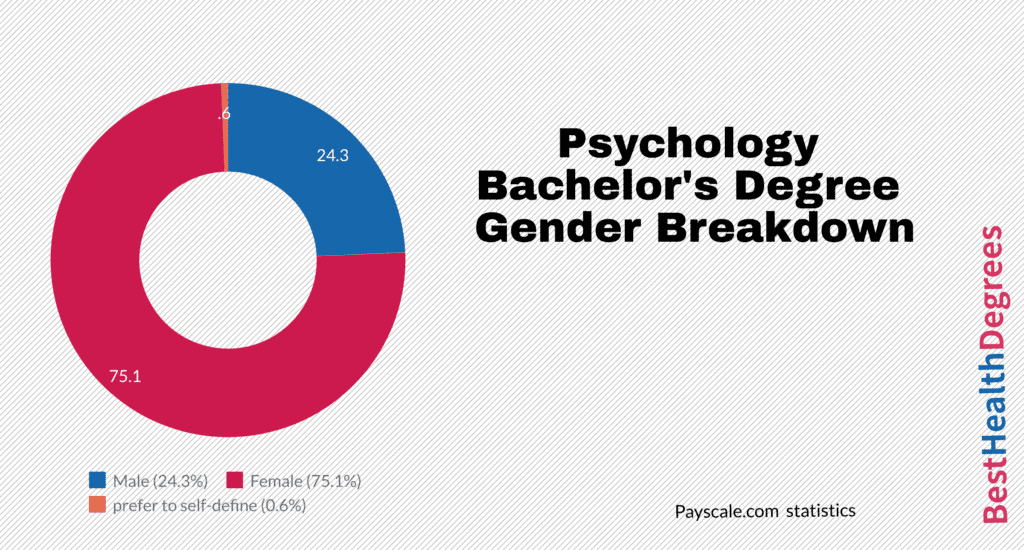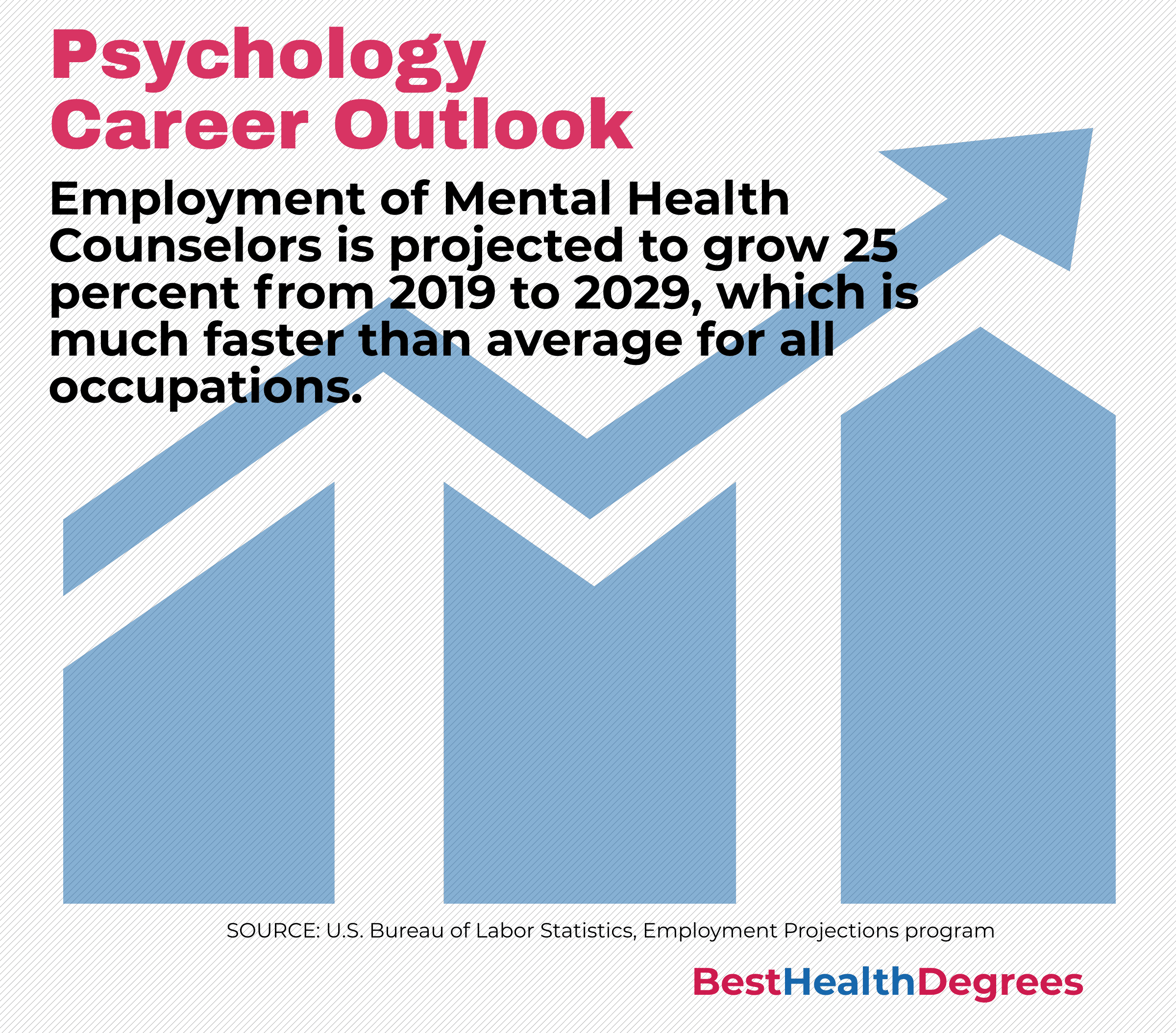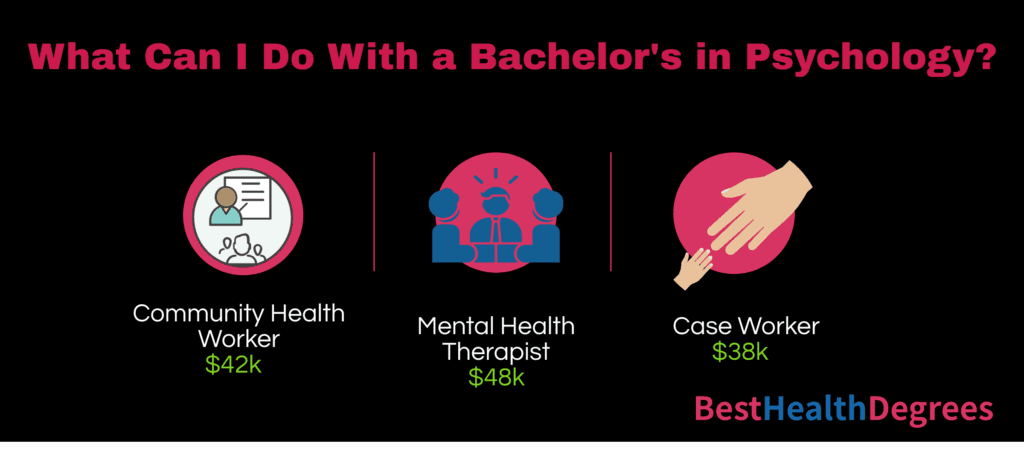Key Takeaways:
- Salaries vary among bachelor’s in psychology grads. Clinical psychologists earn around $82,180 annually, while industrial psychologists can make up to $192,800.
- Bachelor’s in psychology programs cover how humans think, behave, and respond, preparing you for diverse career paths.
- Accreditation is crucial for ensuring quality undergraduate psychology education; look for APA or CACREP accredited programs.
- Specializations in psychology allow for focused study in areas like abnormal, child, or forensic psychology. These can lead to higher pay.
- Joining professional organizations like APA provides networking opportunities and additional resources.
The field of psychology is a fascinating field of study. If you have considered one of the many careers available with a bachelor’s degree in psychology, it is important to consider finding the answers to these questions –
- Is a degree in psychology worth it?
- Why get a psychology degree online or on-campus – what is the difference, if any?
- Is a psychology degree worth it, based on the time it takes to earn the degree?
- Why get a degree in psychology?
The first step in answering the question – Is a degree in psychology worth it? – is to understand what you will study while completing a psychology baccalaureate degree or a master’s degree. Overall, a psychology bachelor’s degree curriculum will include coursework regarding the human brain – deeply diving into how people think, behave and respond to stimulus and information. Psychologists study the processes that impact behavior from a number of perspectives – social, emotional, and cognitive, among others.
Given the available career path options, it should not be a surprise that psychology is considered one of the most popular academic majors, as noted by the National Center for Education Statistics.
So, is a psychology degree worth it? What about a master’s degree? Read on to learn the reasons why a psychology degree is worth the time, effort, and expense.
School and Program Accreditation for Psychology
Deciding which school/university or program to choose from the many available quality psychology programs is a pertinent decision, with far-reaching consequences in your life. It begins by looking for those programs that have received psychology accreditation.
But how would a student decide which of the accredited psychology programs would bethe right fit? Would it be worth the cost to obtain the degree?
The most direct way to determine the quality of any academic program is to determine if the school or program has received regional or specialized accreditation.
The process of accreditation determines if the school or program meets the education criteria set forth by the oversight agency. This process can also provide insight into the school’s programs through a formalized process by an independent, neutral third party. Accreditation is an ongoing process that recognizes the school’s commitment to quality education and the provision of what is promised online. These two types of academic accreditation are discussed next.
Regional Accreditation
Regional accreditation is administered by the United States Federal Government. It is the oldest of accreditations in the country – managed by six regional agencies. CHEA-overseen agencies are tasked with the responsibility of assessing the school or college -ultimately issuing accreditation to the school if the school meets the established criteria.
Regional accreditation offers prospective psychology students certainty as students decide which post-secondary school to attend. This is an essential consideration, especially for those psychology students who may transfer schools and want to bring their earned credits with them or use them to apply to a master’s degree level program.
Specialized Accreditation
Specific degree programs, like a psychology bachelor’s degree and a master’s degree, can receive specialized accreditation. Specialized psychology accreditation provides students with an important assurance; that the psychology degree meets an established set of criteria that industry experts usually determine. In the field of psychology, psychology students should ensure the program has received APA accreditation or is CACREP accredited.
The American Psychological Association (APA)
The COA – the Commission on Accreditation at the American Psychology Association (APA-CoA) is recognized by both the USDE – the United States Department of Education and CHEA as the national accrediting authority for psychology education. APA accreditation policies & guidelines are set to meet nationally- recognized purposes that have been dictated by both governmental & nongovernmental groups.
The Council for Accreditation of Counseling & Related Educational Programs (CACREP)
The Council for Accreditation of Counseling & Related Educational Programs is recognized as a trusted accreditation agency committed to the promotion and advancement of education in the field of counseling. Individual programs are CACREP accredited.
Types of Psychology Bachelor’s Degrees
When studying psychology, students learn to examine the relationship that exists between brain function and one’s human behavior. As noted above, the psychology field is expansive and applies to many career paths. So, if you are thinking about enrolling in an on-campus or online Bachelor’s Degree of Psychology degree program, it is critical to learn about the many specializations and types of psychology degrees available in the marketplace, as this will help refine your search of degree online options.
Most people think of clinical or cognitive therapies when thinking about the field of psychology. However, the reality is that an online Bachelor’s Degree in Psychology has limitless applications across sectors -from personal to professional lives.
Because the curriculum found in a Bachelor’s Degree in Psychology online degree scientifically studies the human mind – in relation to human behavior, its breadth is wide and covers a multitude of inquiries. As such, a degree online (or on-campus) will prepare you for a variety of career paths.
Most types of degrees can open the door to entry-level positions within the fields of social and human sciences.
An on-campus or online Bachelors of Psychology degree also offers the academic foundation for students who wish to further their studies by pursuing many of the many types of psychology master’s degree, and then at the doctoral level.
On-campus or online Bachelors in Psychology degree programs typically require a minimum of 120 semester credits (or 180 quarter credits) to be completed to earn the baccalaureate degree. Most students enrolled in a degree online program will finish the program, on average, in four years or eight semesters. A master’s degree in two years.
And while most Bachelor’s Degree in Psychology online degree programs cover core classes with regard to psychological theory, developmental psychology, as well as a dive into psychological research methods and techniques. In addition, a significant portion of a baccalaureate degree curriculum will include practicum and clinical rotations – which offer practical training from a career-focused perspective.
Psychology Specializations
Within a bachelor’s degree in psychology program, students will often have the option to specialize by selecting from various academic concentrations.
The Abnormal Psychology Major offers students the to focus on psychological issues that lead to dysfunctional human behavior, interpersonal conflict, and misunderstandings. Coursework for the abnormal psychology concentration will explore the following:
- Causes of mental health issues
- Potential Diagnoses of mental health issues
- Tools/Techniques to treat patients with mental health issues
- Ethical considerations, among others.
Career Path Options for Abnormal Psychology Major may include entry-level positions such as mental health counselor, school psychology, clinical psychologist, or psychiatric technician, among others.
The Child Psychology Major – child psychologists work primarily with infants, young children, and adolescents/teenagers. Child psychologists specialize in mental health and developmental disorders that impact young children. They may treat disorders like autism or provide counseling after traumatic events.
Career Path Options for Child Psychology Majors may include child psychologists, school psychologists, career counselor, behavioral therapists, and school counselors, among others.
The Industrial-Organizational Psychology Major may include an industrial-organizational psychologist who is primarily focused on those qualities that help to develop leaders, as well as employee mental health. Among the more common topics that would be part of an industrial psychologist’s responsibilities are work to improve workplace productivity, better employee satisfaction, and increase company morale as a collective means to improve productivity and revenue.
Career Paths for Industrial-Organizational Psychology Majors – may include an organizational psychologist, career counselors, a corporate trainer, a human resource manager, school psychology, recruiter, to name a few.
The Forensic Psychology Major – a forensic psychology major, will be required to take classes that explore these topics as they learn how to identify patterns in criminal behaviors as well designing interventions – some psychology career paths
- Criminology
- Career counselors
- Human resources specialist
- The Criminal Justice System
- Abnormal psychology, to name just a few.
Career Paths for Forensic Psychology Majors – Forensic psychologist, probation officer, or criminal profiler
The Cognitive Psychology Major – psychology graduates studying to be a cognitive psychologist explore those mental processes and mental health impacting one’s attention, career counselors, human behavior, memory, & problem-solving abilities. The cognitive psychology concentration very often overlaps and integrates seamlessly with other psychological specialties.
Career Paths for Cognitive Psychology Majors – Counselor, clinical psychologist, behavioral psychologist, or human resources manager.
Careers with a Psychology Bachelor’s
A bachelor’s degree in psychology will explore the ways in which people think, which, ultimately, can be quite beneficial to careers that require people skills. This means that there are many available and diverse careers in psychology. So, consider these important questions regarding psychology career path options around mental health –
- What can I do with a Bachelor’s Degree in Psychology?
- Is psychology a good career choice for my skillset?
- What are the available Bachelor’s Degree in Psychology entry-level jobs in my job market?
- Is psychology a good career choice if I want to also complete my graduate studies?
- What can I do with a Bachelor’s Degree in Psychology if I want to study abroad?
If you have asked yourself – ‘I have my BA in psychology now what? – read on to learn about the many things you can do with a degree in psychology with regard to the available careers in psychology.
For example, those students with a mind for business will realize that psychology offers the necessary insight into the human mind (and thus, behavior) with regard to marketing and consumer trends. On the other hand, careers in psychology also include jobs that are not profit-driven, working as a social worker, a teacher, or one of the many Bachelor’s Degrees in Psychology entry-level jobs in counseling.
The things you can do with a degree in psychology depend on one’s career objectives. Most people make an erroneous assumption that most Bachelor’s Degree in Psychology entry-level jobs are only in the field of psychology – as a psychoanalyst, clinical therapist, or mental health professional.
There are non-clinical careers in psychology also. The answer to the question – What can I do with a Bachelor’s in Psychology that is not related to clinical practice? – includes the following specialty areas –
- Social services or human resources.
- Business in the areas of marketing or sales, among others.
- Criminal justice
- Education, to name a few.
Bachelor’s Degree in Psychology Salary
One of the most essential questions to answer as you consider a career with your psychology bachelor’s degree. What is the average psychologist salary, and how do salaries for high-paying jobs with a Bachelor’s in Psychology differ?
In 2019, there were more than 190,000 psychologists working in the United States. Overall, the median annual salary for psychologists for 2020 was $82,180, which translates to $39.51 per hour.
The reality is that to understand what the average psychologist’s salary is, one must look at the range of salaries across a continuum.
The Bachelor’s Degree in Psychology Salary Potential – Clinical or School Psychologists
The following represents the bachelor’s degree in psychology salary percentiles for psychologists who are working as clinical counselors or school psychologists.
| Percentile | Bachelor’s Degree in Psychology Salary |
|---|---|
| 10% | $ 46,410 per year |
| 25% | $ 60,750 per year |
| Median – 50% | $ 79,820 per year |
| 75% | $ 104,860 per year |
| 90% | $ 138,550 per year |
The high paying jobs with a Bachelor in Psychology are expected to grow at the same pace as all psychology jobs – about 3% through 2029
The top-paying states for psychologists (clinical/school) are as follows –
| State | # Employed | Bachelor’s Degree in Psychology Salary – School Counselor |
|---|---|---|
| California | 17,210 | $ 115,830 per year |
| Hawaii | 410 | $ 110,780 per year |
| Louisiana | 270 | $ 109,180 per year |
| Oregon | 1,520 | $ 108,000 per year |
| District of Columbia | 660 | $ 106,920 per year |
The Bachelor’s Degree in Psychology Salary Potential– Industrial or Organization Psychologists
The range of salaries for those psychologists working as industrial or organizational psychologists are as follows :
| Percentile | Bachelor Degree in Psychology Salary – Organization/Industrial |
|---|---|
| 10% | $ 57,440 per year |
| 25% | $ 69,780 per year |
| Median – 50% | $ 96,270 per year |
| 75% | $ 137,930 per year |
| 90% | $ 192,800 per year |
The top-paying states for psychologists (organizational/industrial) are as follows –
| State | # Employed | Bachelors in Psychology Salary – Organization/Industrial |
|---|---|---|
| California | 190 | $ 119,100 per year |
| New Jersey | – | $ 106,570 per year |
| Ohio | 30 | $ 98,770 per year |
| Pennsylvania | 30 | $ 95,000 per year |
| Texas | 40 | $ 64,820 per year |
The top-paying states for psychology majors who work as sociologists –
| State | # Employed | Bachelors in Psychology Salary |
|---|---|---|
| North Carolina | 50 | $ 109,930 per year |
| California | 980 | $ 106,870 per year |
| Illinois | – | $ 95,860 per year |
| Massachusetts | 120 | $ 92,080 per year |
| Maryland | 140 | $ 88,290 per year |
Other High Paying Jobs with a Bachelor in Psychology
As noted previously, there are many careers available to those who hold a bachelor’s degree in psychology. These are discussed next.
- Marriage & Family Therapist – work to help individuals overcome and manage familial and other relationships.
- 2020 Median Pay – $51,340 per year – or $24.69 per hour.
- Ten Year Growth Rate – – 22%, more than seven times the national average.
- Number of Professionals Employed in 2019 – 66,200
- Market Researchers– work to study behavioral patterns to help increase sales and revenue.
- 2020 Median Pay – $65,810 per year – or $31.64 per hour.
- Ten Year Growth Rate – 18%, more than six times the national average.
- Number of Professionals Employed in 2019 – 738,100
- Social Workers – work to help solve client issues that occur in life’s everyday routines.
- 2020 Median Pay – $51,760 per year – or $24.88 per hour.
- Ten Year Growth Rate – 13%, which is much faster than average.
- Number of Professionals Employed in 2019 – 713,200
- Sociologists – study social behavior against societal behaviors and norms.
- 2020 Median Pay – $86,110 per year – or $41.40 per hour.
- Ten Year Growth Rate – 4%, about average.
- Number of Professionals Employed in 2019 – 3,200
- Substance Abuse/Mental Health/Behavioral Disorder -treat individuals who are challenged by addiction (drugs/alcohol/sex/gambling/food) or by other behavioral/mental problems.
- 2020 Median Pay – $47,660 per year – or $22.91 per hour.
- Ten Year Growth Rate – 25%, more than seven times the national average.
- Number of Professionals Employed in 2019 – 79,000
- Training & Development Specialists
- 2020 Median Pay – $62,700 per year– or $30.14 per hour.
- Ten Year Growth Rate – 9%, which is twice as fast as average.
- Number of Professionals Employed in 2019 – 327,900
- Survey Researchers – create, design, and implement surveys to amass data to be analyzed for various reasons and purposes.
- 2020 Median Pay – $59,870 per year – or $28.79 per hour.
- Ten Year Growth Rate – -4%, a decrease is anticipated.
- Number of Professionals Employed in 2019 – 12,200
- School Counselors -offer guidance to students as they negotiate both their social world and academic objectives.
- 2020 Median Pay – $58,120 per year – or $27.94 per hour.
- Ten Year Growth Rate – 8%, which is twice as fast as average.
- Number of Professionals Employed in 2019 – 333,500
- Postsecondary Teachers – instruct students across a broad area of academic, scientific, and academic topics.
- 2020 Median Pay – $80,790 per year.
- Ten Year Growth Rate – 9%, which is about twice as fast as average.
- Number of Professionals Employed in 2019 – 1,329,900

Professional Organizations in Psychology
Professional organizations are created by industry advocates/experts to support the industry in which it serves. Also, professional organizations tend to act as the voice of the industry’s professionals and companies.
The psychology profession is no different and offers a variety of professional organizations from which to choose. Each professional organization is dedicated to supporting professionals in a particular slice of the psychological realm.
Professional organizations offer their members many benefits, which include:
- Networking Opportunities.
- National and Regional Conferences/Seminars for members.
- Continuing Education opportunities.
- Awards & Recognition.
- Job Boards.
- Publications & Other Resources.
- Advocacy.





The American Psychological Association (APA)
The APA is recognized to be the biggest professional & scientific organization that represents the field of psychology and its professional members.
The American Psychological Association (APA) members are more than 130,000 strong across the globe. Members include clinicians, students, educators, researchers, and consultants. The American Psychological Association’s mission is to advance the knowledge/communication/application of psychology knowledge (that is research-based) to the benefit of society and individual lives. Professional psychologists who are American Psychological Association members receive benefits that include:
- Discounts Programs for journals & books,
- Online access to databases,
- A subscription to The American Psychologist
- Registration discounts on participating in the organization’s yearly conference for additional learning options.
National Alliance of Professional Psychology Providers (NAPPP)
The National Alliance of Professional Psychology Providers (NAPPP) is a professional organization that promotes & advances clinical psychology practice, with a strong mission to promote doctoral level psychological care to improve healthcare. The National Alliance of Professional Psychology Providers offers membership to any doctoral (Ph.D.) student or active or retired licensed doctoral psychologist.
The annual membership fee for the National Alliance of Professional Psychology Providers offers members free continuing education, practice tools, a subscription to its professional newsletter, and options to obtain malpractice insurance for professional psychologists.
Other Professional Organizations
Depending on your career objectives or your interest in research, these professional organizations may be of interest to psychology majors or graduates:
- The American Educational Research Association (AERO), with more than 25,000 international members, is committed to promoting the advancement of knowledge with regard to education and the service of the public good. The AERO is recognized as the largest interdisciplinary research professional association.
- The Society for Personality and Social Psychology – established in the mid-1970s, the Society for Personality & Social Psychology has more than 7,000 members and is recognized as the largest organization that is dedicated to the promotion of teaching, science, and how social/personality psychology is applied.
- The National Association of School Psychologists (NASP) – the National Association of School Psychologists is a professional organization focused on supporting school psychologists. With a membership that exceeds 25,000, the NASP ranks as the largest in the world that is dedicated to school psychologists, with a mission to advance those practices with regard to the learning, mental health ad behavior of students.
- The Association for Behavioral & Cognitive Therapies (ABCT) – established more than fifty years ago by a number of professional behaviorist professionals, the Association for Behavioral & Cognitive Therapies is committed to the advancement of those scientific approaches in the realm of behavior and cognitive behavioral health approaches. Many preeminent scholars have honored the Association for Behavioral & Cognitive Therapies by presiding over ABCT since its inception.
Related:




